Royal Mail has said it’s forcing up to 10,000 postal workers out of their jobs. It’s claiming that this is because of the Communication Workers’ Union’s (CWU’s) strike action, as well as financial losses. However, the union has hit back, saying the redundancies will be because of “gross mismanagement“. And now, nearly 50 MPs have rallied in support of workers – many of them being prominent members of the Jeremy Corbyn-era Labour Party.
CWU: fighting Royal Mail redundancies
BBC News reported that Royal Mail will be axing 6,000 jobs. It also won’t replace 4,000 positions when current staff leave. According to BBC News, Royal Mail said this was because:
it expects its full-year losses to hit £350m. It said this included “the direct impact of eight days of industrial action” as well as lower volumes of parcels being posted. But the firm warned that losses could reach as much as £450m “if customers move volume away for longer periods” following strike action.
CWU workers have been engaged in strike action. This is over Royal Mail’s paltry pay offer of nearly half the rate of inflation, as well as worsening working conditions. The last CWU strike day – on 13 September, which was the sixth in this action – saw 110,000 workers walk out. They will be downing tools again on Thursday 20 October. Predictably, Royal Mail boss Simon Thompson blamed the workers for the redundancies. He said that:
Each strike day weakens our financial situation. The CWU’s decision to choose damaging strike action over resolution regrettably increases the risk of further headcount reductions.
Thompson’s divisive and anti-worker rhetoric comes against a backdrop of Royal Mail making £758m last financial year and paying £400m of that in dividends to shareholders. As the Canary previously reported, this is the usual case of corporate capitalist bosses keeping shareholders happy while screwing over workers. So now, MPs have stepped in.
Corbynite MPs out in force
As the CWU tweeted, 45 MPs have written to Royal Mail’s boss:
45 MPs have written to Simon Thompson demanding that he agrees to meet with the full Royal Mail Board and the CWU and attacking the disgraceful announcement on Friday.
Mr Thompson is on his own. #StandByYourPost pic.twitter.com/DGo7xVqbeY
— The CWU (@CWUnews) October 16, 2022
The letter was headed up by Ian Lavery MP, who is chair of the CWU parliamentary group. It called Royal Mail’s redundancies:
a disgraceful attack on these key workers, who are taking strike action to protect their livelihoods.
What was noteworthy in the letter was who signed it. Many of the MPs were prominent during Corbyn’s time as Labour leader – including Apsana Begum, Zarah Sultana, Bell Ribeiro-Addy, Nadia Whittome and Richard Burgon. Current members of Labour’s shadow cabinet cannot sign these kind of letters. However, some have tweeted their support:
As a PPS, I cannot sign around Robin letters but I will be making representations to Royal Mail separately on behalf of my constituents. https://t.co/zfLlfiC5c0
— Paula Barker MP (@PaulaBarkerMP) October 16, 2022
So far, Keir Starmer has barely supported the CWU, or any other strikes for that matter. As the Guardian reported, CWU general secretary Dave Ward tabled a motion at the Labour conference on renationalising Royal Mail. The conference passed the motion, along with one about MPs attending picket lines.
Royal Mail: asset-stripping while trashing workers’ livelihoods
On Royal Mail’s redundancies, the Morning Star reported that Ward said they were because of:
gross mismanagement and a failed business agenda.
He told Royal Mail bosses that:
What the company should be doing is abandoning its asset-stripping strategy and building the future based on utilising the competitive edge it already has in its deliveries to 32m addresses across the country.
Not that they will listen, at the moment. So tens of thousands of workers will again walk out on 20 October. And everyone in Labour, not just some MPs, should be supporting them.
Featured image via Chatham House – Wikimedia, resized to 770×403 under licence CC BY 2.0, and Alex Borland – Public Domain Pictures
By Steve Topple
This post was originally published on Canary Workers’ Co-op.
 (@_JD_Black)
(@_JD_Black) 

 (@joinaunionpls)
(@joinaunionpls) 

 ) must be rolling around laughing.
) must be rolling around laughing.


 :
:




 of all the strike action going on right now!
of all the strike action going on right now!
 (@BThroughParty)
(@BThroughParty) 
 As the banner says: We are strong together!
As the banner says: We are strong together! 

